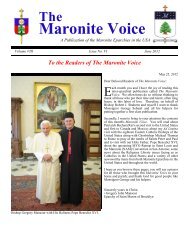March 2013 - Eparchy of Saint Maron of Brooklyn
March 2013 - Eparchy of Saint Maron of Brooklyn
March 2013 - Eparchy of Saint Maron of Brooklyn
Create successful ePaper yourself
Turn your PDF publications into a flip-book with our unique Google optimized e-Paper software.
The Resignation and Election <strong>of</strong> A Pope<br />
by<br />
Chorbishop John D Faris, J.C.O.D.<br />
On February 11, <strong>2013</strong>, Pope Benedict XVI stunned the<br />
world with the announcement that he intended to<br />
resign, effective February 28, <strong>2013</strong>. In worldly terms,<br />
Pope Benedict gave the Church his “two-week notice.” (The<br />
announcement was made in Latin and the press <strong>of</strong>ten literally<br />
translated the term renuntiat as "renounce." In canon law,<br />
the term is translated as resign; as a canonist, I shall employ<br />
that term. However, the translation <strong>of</strong> the term as renounce<br />
allows us to appreciate the theological richness <strong>of</strong><br />
relinquishing the “Keys <strong>of</strong> Peter.”) The reason he gave was<br />
that he no longer had the capacity because <strong>of</strong> his advanced<br />
age to carry out the responsibilities <strong>of</strong> the papacy. The pope<br />
will turn 86 on April 16.<br />
Cardinal Joseph Ratzinger was elected to the Chair <strong>of</strong> Peter<br />
by the cardinals on April 19, 2005. He was the only cardinal<br />
present in the conclave (more about the word conclave later)<br />
who had not been appointed as Cardinal by his predecessor<br />
Pope John Paul II, but had been appointed by Pope Paul VI<br />
in 1977.<br />
This resignation is an act <strong>of</strong> faith and trust that the Holy<br />
Father has in God; so many <strong>of</strong> us have the false opinion that<br />
the world depends on us. We place our confidence not in<br />
Divine Providence, but in our own feeble abilities. The<br />
resignation is also an act <strong>of</strong> humility: Pope Benedict came to<br />
realize that he was no longer capable <strong>of</strong> carrying out the<br />
responsibilities <strong>of</strong> his <strong>of</strong>fice and placed the interests <strong>of</strong> the<br />
Church above his own. The resignation is also an act <strong>of</strong><br />
courage; the last resignation <strong>of</strong> a pope took place six<br />
centuries ago, the Holy Father was not afraid to make such a<br />
decision.<br />
The Pope expressed his desire to continue to serve the<br />
Church by devoting himself to prayer and reflection. He will<br />
do so in a residence (a former cloistered monastery) in the<br />
Vatican.<br />
Resignation <strong>of</strong> A Pope<br />
While there is no required retirement age for the Pope (it is<br />
set at 75 for bishops), Church law provides for the possibility<br />
<strong>of</strong> a papal resignation: Canon 332 §2 <strong>of</strong> the 1983 Code <strong>of</strong><br />
Canon Law states: “If it happens that the Roman Pontiff<br />
resigns his <strong>of</strong>fice, it is required for validity that the<br />
resignation is made freely and properly manifested but not<br />
that it is accepted by anyone.” In everyday language, the<br />
Pope cannot be forced to resign, nor can anyone stop him<br />
from retiring.<br />
We saw it on February 11: Pope Benedict XVI announced his<br />
intention to resign and indicated the date that it will take<br />
effect. That is all that is needed.<br />
In a 2010 interview, Pope Benedict XVI, when asked about<br />
Pope Benedict XVI<br />
the possibility <strong>of</strong> a papal resignation, affirmed it might even<br />
be the obligation <strong>of</strong> a pope to resign: “Yes, if a Pope clearly<br />
realizes that he is no longer physically, psychologically, and<br />
spiritually capable <strong>of</strong> handling the duties <strong>of</strong> his <strong>of</strong>fice, then he<br />
has a right and, under some circumstances, also an obligation<br />
to resign.”<br />
Church law requires that a resignation be freely made: CIC c.<br />
187: “Anyone responsible for oneself (sui compos) can resign<br />
from an ecclesiastical <strong>of</strong>fice for a just cause.” A grave<br />
problem would arise if the Pope were to be afflicted with<br />
Alzheimer’s or dementia: because he was not sui compos, he<br />
could not resign. There are no provisions in the law <strong>of</strong> the<br />
Church for such a case.<br />
While the last resignation was in 1415 (by Pope Gregory XII<br />
at the request <strong>of</strong> the Council <strong>of</strong> Constance to help resolve the<br />
Great Western Schism), historians tell us that as many as ten<br />
popes have resigned. A more well-known case is that <strong>of</strong><br />
Pope Celestine V (1294). The poor man, known as Peter the<br />
Hermit, was eighty years old when the cardinals elected him<br />
by acclamation after a two-year impasse. He was incapable<br />
<strong>of</strong> carrying out the administrative and diplomatic<br />
responsibilities <strong>of</strong> the papacy and resigned after only five<br />
months. Even then his fortunes did not improve: his<br />
successor imprisoned him out <strong>of</strong> fear that the monk-hermit<br />
would attempt to reclaim the papacy. Some speculate that<br />
Dante portrayed the Celestine in the antechamber <strong>of</strong> Hades,<br />
condemning him for cowardice.<br />
Governing the Church During the<br />
Vacancy<br />
When a pope dies or resigns, the See <strong>of</strong> Peter is vacant. This<br />
was the case on February 28. Most <strong>of</strong> the Church will not be<br />
directly affected. The Eucharist will continue to be<br />
The <strong>Maron</strong>ite Voice Volume IX Issue No. III Page 10 <strong>March</strong> <strong>2013</strong>

















